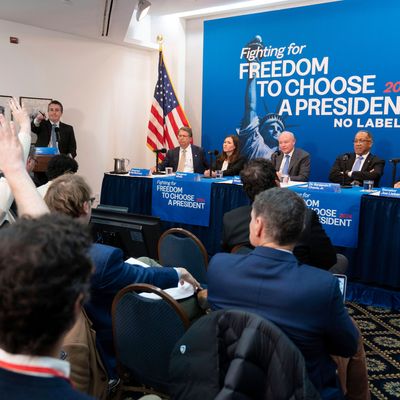
In one of the less surprising developments of the political year, the nonpartisan No Labels organization is abandoning its plans to run a presidential “unity ticket” in November. The group confirmed the news via a statement emailed out on April 4:
Today, No Labels is ending our effort to put forth a Unity ticket in the 2024 presidential election.
Americans remain more open to an independent presidential run, and hungrier for unifying national leadership, than ever before. But No Labels has always said we would only offer our ballot line to a ticket if we could identify candidates with a credible path to winning the White House. No such candidates emerged, so the responsible course of action is for us to stand down.
The statement was probably triggered by a report from The Wall Street Journal:
Nancy Jacobson, No Labels’ founder and CEO, told allies this week that the group would announce Monday that it won’t pursue a presidential campaign this year because it hasn’t been able to recruit a credible ticket that could win the election, the people said.
Jacobson told supporters that the organization had reached out to 30 potential candidates during its process.
The precise number of rejections No Labels encountered is both newsy and embarrassing. The procession of high-to-medium-profile politicians publicly expressing a lack of interest in joining the “unity ticket” had become a regular drumbeat in recent weeks. My own running list of announced No Labels no-thank-yous included Larry Hogan, Joe Manchin, Liz Cheney, Nikki Haley, Deval Patrick, Brian Kemp, Chris Sununu, Chris Christie, Geoff Duncan, Mitt Romney, and Jon Huntsman. I may have missed a few; NBC News indicated recently that the organization had fruitlessly gone well off-road in the search for a presidential candidate:
Well-known non-politicians like businessman Mark Cuban and retired Navy Adm. William McRaven did not reciprocate interest from No Labels, either. No Labels’ search has gone far and wide — it even tried to make overtures to Dwayne “The Rock” Johnson.
It’s easy to mock No Labels for its fecklessness, but the group did make good on its promise to bag the whole thing if it could not identify a ticket positioned to actually win 270 electoral votes. Polls consistently showed that the idea of a “unity ticket” was more popular than an actual “unity ticket,” so it made sense that as the group proceeded down its wish list of candidates, the weak case for the whole enterprise would begin to vanish. In the end, the intense pressure the group’s leadership was under to avoid a “spoiler” scenario that could help Donald Trump get back into the White House despite a weak popular-vote performance was a crucial factor in the No Labels No Go decision. The late No Labels leader Joe Lieberman consistently said that “the last thing I’d ever want to be part of is bringing Donald Trump back to the Oval Office.” He can now rest in peace in the certainty that won’t happen, and Joe Biden’s team also has one less major problem to address.
No Labels retires from the 2024 field having achieved ballot access in 19 states. That accomplishment will be looked on enviously by remaining non-major-party candidates Robert F. Kennedy Jr., Cornel West, and Jill Stein. It remains to be seen if the perennial fantasy of a centrist third party — or as No Labels insisted it represented, a centrist bipartisan effort to force the major parties to work together — will live on.
More on politics
- Trump Ambassador Picks: Who’s in His ‘Diplomatic Clown Car’
- What We Learned From the House Ethics Report on Matt Gaetz
- Everyone Biden Has Granted Presidential Pardons and Commutations






























